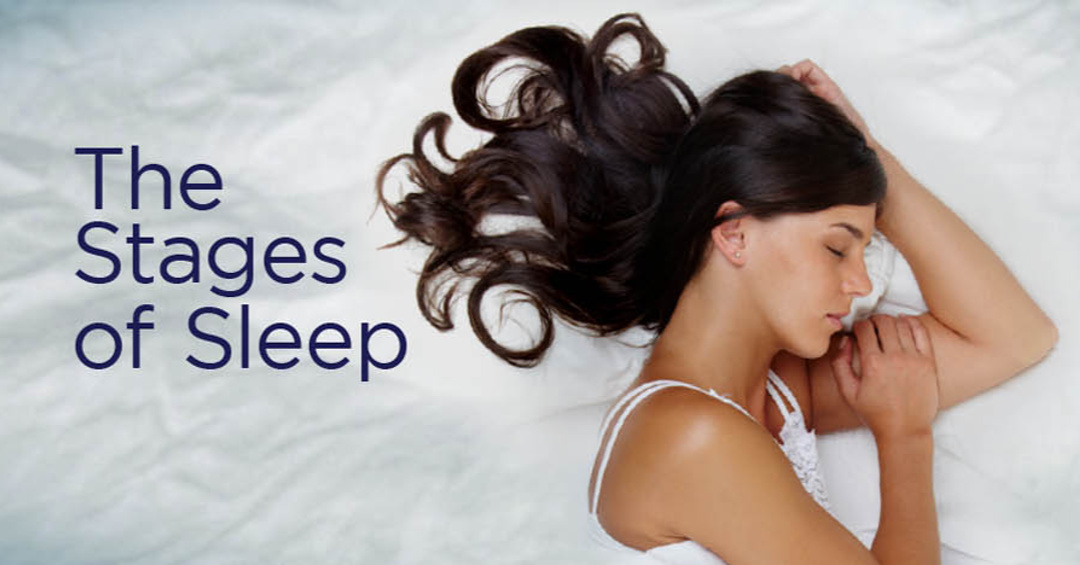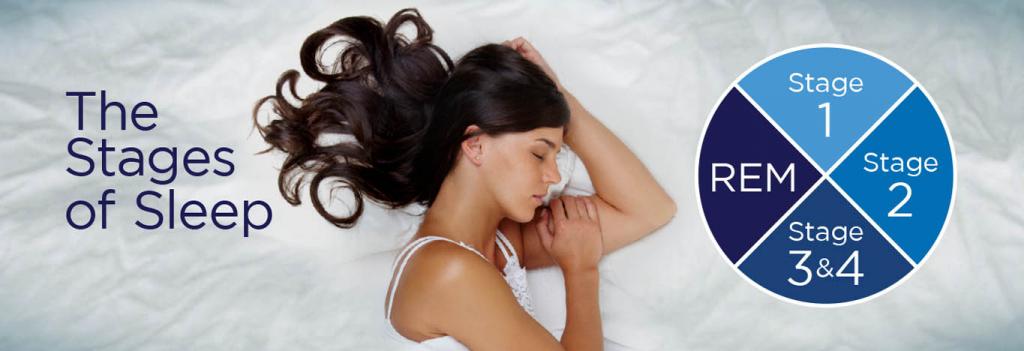Sleep & Health
What are the stages of sleep? Explore the four sleep cycle stages and actionable tips to boost your sleep quality in this easy guide.

Sleep is a vital part of our daily lives. Without it, our bodies and minds lack the rejuvenation needed to function.
Poor sleep can also make it harder to focus, cause fatigue, and affect your physical and mental health in the long term.
Our perception of sleep makes it feel very straightforward. It might seem like we close our eyes and wake up the following day.
However, the journey through sleep is far more intricate. But what are the stages of sleep, and why do they matter?
Sleep consists of various stages, each with unique characteristics and functions. Understanding these stages is the key to unlocking better, more restful sleep.
Let’s explore the stages of sleep, the science behind them, and how you can harness this knowledge to improve your rest and well-being.
How Many Stages of Sleep Are There?
There are four different stages of sleep. They’re categorized into two main types:
- Rapid Eye Movement (REM) sleep
- Non-Rapid Eye Movement (NREM) sleep
These two types are then broken down into four separate sleep stages.
The four stages of sleep are:
- NREM N1
- NREM N2 (also known as light sleep)
- NREM N3 (also known as deep sleep)
- REM Sleep
But what’s the difference between them, and how do they impact your sleep?
What Are the Stages of Sleep?

As you go through the four stages of sleep, your brain waves and body react in different ways.
Your eyes move under your lids, your heart rate and temperature change, and your hormones focus on growth and rejuvenation.
Each stage of sleep serves a different role in rejuvenating your body. So what are the stages of sleep, and what does each one do?
1. Stage 1 Sleep
Stage 1 is the transitional phase from wakefulness to sleep. At this point, you are especially susceptible to disturbances that can wake you up again.
What Happens in Stage 1 of Sleep?
- You will wake up quickly in this stage, and your muscle activity decreases.
- Slow eye movements characterize stage 1, and your brain produces theta waves.
- Typically, stage 1 sleep lasts for only a few minutes.
2. Stage 2 Sleep
Stage 2 is the first “true” stage of sleep. Also known as light sleep, this accounts for about half the total time you spend sleeping.
What Happens in Stage 2 of Sleep?
- During this stage, your heart rate and body temperature decrease.
- You experience sleep spindles, which are brief bursts of rapid brain activity.
- Stage 2 sleep is crucial for memory consolidation.
3. Stage 3 Sleep
Stage 3 sleep (or deep sleep) is a restorative sleep phase. Slow brain waves, reduced muscle activity, and limited response to external stimuli characterize it.
This stage of sleep is crucial for physical recovery and memory consolidation.
What Happens in Stage 3 of Sleep?
- In this stage, your brain produces slow delta waves.
- It is the most restorative stage, promoting physical and mental recovery.
- Growth hormone is released during deep sleep, aiding tissue repair and growth.
4. REM Stage of Sleep
REM sleep is characterized by rapid and random eye movements similar to those seen when you are awake.
During REM sleep, your body experiences temporary muscular paralysis while your brain is far more active.
What Happens in the REM Stage of Sleep?
- Your brain activity during REM sleep is similar to that of wakefulness.
- This stage is where most dreaming occurs.
- REM sleep is essential for processing emotions and consolidating memories.
What Stage of Sleep Is Most Important?
Many experts consider REM sleep to be the most crucial stage of sleep.
During REM sleep, your brain is highly active, which is when most of your dreaming occurs.
This stage plays a significant role in processing emotions, making sense of experiences, and consolidating memories.
Without sufficient REM sleep, you may experience cognitive and emotional difficulties.
What Can Affect Your Sleep Cycle?
Several factors can influence the quality of your sleep. Some may be obvious, like drinking coffee before bed or trying to sleep when your neighbors are having a boisterous party.
But many of the elements that can affect your sleep might surprise you:
- Stress: High stress levels can lead to difficulty falling asleep. It also interrupts your sleep stages, particularly deep sleep and REM sleep.
- Sleep Disorders: Conditions such as sleep apnea, insomnia, acid reflux, and restless leg syndrome can make it challenging to progress uninterrupted through the four stages of sleep.
- Diet and Exercise: Coffee and heavy foods before bed will often keep you up and disrupt your sleep for most of the night.
- Alcohol: Consuming alcohol may make you fall asleep faster, but it often results in poor sleep quality all night. As your liver enzymes metabolize the alcohol, your sleep cycle stages will be disrupted, and you’ll likely wake up feeling tired.
- Inconsistent Sleep Schedule: Changing your bedtime and wake time can confuse your internal body clock and skew your sleep cycle.
- Environmental Factors: Noise, light, and temperature all affect the depth and quality of your sleep. Though everyone’s ideal sleep environment is different, if yours is too hot, cold, noisy, or bright, you’ll likely experience poor sleep even after you drift off.
- An Uncomfortable Mattress: Trying to fall asleep on a bed that doesn’t provide enough support, cushioning, or temperature control is a recipe for a poor night’s sleep. Regarding tools to improve your nightly sleep, the right kind of mattress should be at the top of your list.
Also Read: 5 Types of Mattresses Explained (And How to Choose One)
How to Improve Your Sleep Cycle (5 Easy Tips)
Waking up in the morning feeling tired despite being in bed all night is a frustrating experience.
To achieve a more consistent and restorative sleep cycle, consider implementing the following tips:
1. Maintain a Consistent Sleep Schedule
Staying out late for the occasional get-together will likely have a short-term effect on your sleep cycle.
But your body may struggle to adjust if you constantly go to bed and wake up at wildly different times.
Going to bed and waking up at the same time every day, even on weekends, helps regulate your body’s internal clock so you can fall asleep faster and move seamlessly through all four stages of sleep.
2. Create a Relaxing Bedtime Routine
In the modern era of bright lights, handheld devices, and constant social connections, getting into the right mindset for sleep can be challenging.
A great way to get your mind and body ready for sleep is by turning off your computer, television, and other devices before bed (or activating the blue light filter if you still need to use them).
Instead of screen time, try calming activities such as reading, bathing, or meditation.
3. Optimize Your Sleep Environment
We can’t always control the environmental factors that make our sleep better.
But even if you don’t have air conditioning or live in a noisy apartment building, creating the ideal sleep environment can do wonders for your sleep cycle.
Make sure your room is dark, quiet, and at a comfortable temperature before you go to bed. Blackout curtains, white noise machines, and fans are excellent sleep investments.
4. Watch Your Diet and Exercise
Staying away from heavy meals and caffeine right before bedtime might seem like obvious advice. But it’s also essential to avoid drinking alcohol before bed as well.
Even though alcohol can make you sleepy, it often disrupts your sleep cycle and leads to less restful sleep.
While exercise can promote better sleep, try to finish your workouts at least a few hours before bed to give your body time to relax before you sleep.
5. Invest in a Bed That Improves Your Sleep
No matter how dark and quiet your room is or how careful you are about screen time and caffeine, you’ll get a poor night’s sleep if you’re lying on an uncomfortable mattress.
The wrong bed can keep you awake at night, leave you sore and tired in the morning, and prevent you from getting the most out of your body’s essential rest period.
If you’re struggling with healthy sleep and aren’t sure why, it may be time to replace your mattress.
Also Read: 5 Benefits of Sleep Tracking: Do They Really Improve Sleep?
Discover Better Sleep at BedMart
Experience rejuvenating sleep with BedMart!
Quality sleep is not just about feeling refreshed; it’s crucial for your body’s healing and self-care. Repeated poor sleep can harm your health, making the right mattress essential.
Curious about optimizing your sleep stages? Let us guide you.
Explore our range of cozy mattresses, pillows, and bedding designed for the ultimate sleep experience. Whether in-store or online, you’ll find the perfect fit for your unique needs.
Our sleep experts are also eager to assist you in choosing a bed that promises years of restful nights.
Visit BedMart for a step towards transformative sleep!
Stages of Sleep FAQ
Answers to common questions about the four stages of sleep.
What Is a Sleep Cycle?
A sleep cycle is a recurring pattern your body forms during sleep. It consists of multiple stages, including non-REM and REM sleep.
Each cycle typically lasts around 90 minutes. Also, the average person experiences four to six sleep cycles per night.
How Long Is a Sleep Cycle?
A typical sleep cycle lasts approximately 90 minutes, but variations can occur.
These cycles repeat throughout the night, with the duration of each stage varying as the night progresses.
What Stage of Sleep Do You Dream?
Most dreaming occurs during the Rapid Eye Movement (REM) stage of sleep. Brain activity is similar to wakefulness during this stage, and vivid dreams often occur.
What Is the Deepest Stage of Sleep?
The deepest stage of sleep is Stage 3, also known as slow-wave sleep (SWS).
During this stage, the brain produces slow delta waves. It’s also considered the most restorative stage of sleep.
How Much Deep Sleep Do You Need?
The ideal amount of deep sleep varies by age. Adults may need around 20-25% of their total sleep time in the deep sleep stage, which is about 1.5 to 2 hours.
What Stage Does REM Sleep Occur?
REM sleep, or Rapid Eye Movement sleep, is the fourth stage of sleep. It occurs after the non-REM stages.
REM typically starts around 90 minutes after falling asleep and recurs overnight.
How Much REM Sleep Do You Need?
The ideal amount of REM sleep also varies with age. On average, adults spend about 20-25% of their total sleep time in the REM stage.
REM sleep is crucial for emotional processing and memory consolidation.
Which Is Better: REM or Deep Sleep?
Both REM and deep sleep are essential for overall health.
Deep sleep (stage 3) is crucial for physical restoration.
REM sleep plays a crucial role in mental and emotional well-being.
A balance of both stages is necessary for optimal sleep quality and cognitive function.